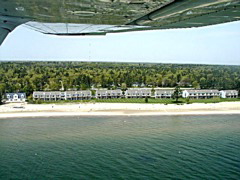Association Projects Update
The Sprinklers: The main line to the sprinkler system has been re-routed. It used to go under the parking lot from between units 20 & 21 to the mail boxes. The main line broke somewhere under the parking lot by the mail boxes sometime this Spring. AA Lawncare, George & Jerry tried to insert a smaller hose through the broken one to repair the line. Due to the break misalignment that couldn't be accomplished so they dug a trench from the mail boxes north north-west, around the north end of the garages and building #7 to the lakeside of Sam & Patty's unit# 31. They also added gate valves in several places so we can shut the water down to any particular area in case of a leak.
The Decks: The decks are all restained. Thanks again for keeping your furniture off of the decks during this project.
Spider Spray: The spider Lady is due to come out this week
Parking Area: Also scheduled to be out this week is the asphalt guy to fill the cracks in the parking lot.



